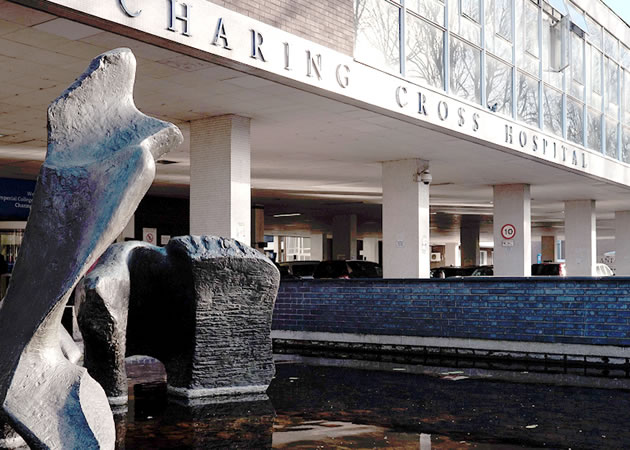Local Hospital Repair Bill Now Tops a Billion Pounds
Maintenance backlog biggest of any NHS Trust in the country

Charing Cross Hospital needs at least £140 million in repairs
Local hospitals including Charing Cross and Hammersmith will need £1.3 billion to fix an urgent backlog of repairs – the biggest backlog of any NHS organisation.
Imperial College Healthcare NHS Trust will need the massive sum of cash to prevent a high-risk disruption to services in the future – partly due to the age of their estate.
The trust said it has the biggest backlog maintenance liability of all NHS Trusts – up to £1.3 billion in its 2020/21 annual report – the most up to date information available.
The trust’s Charing Cross Hospital needed an estimated £140 million to fix serious issues in the hospital building in 2019/20.
St Mary’s Hospital, also run by Imperial College Healthcare NHS Trust, had a £121.5 million high-risk backlog in 2019/20, with £63.9 million needed to for maintenance at Hammersmith Hospital.
More than £2.5 billion is needed to fix serious issues in hospital buildings across London – with the cost of tackling potentially life-threatening issues rising to nearly three-quarters of a billion.
The pandemic has potentially delayed repair work, with funding diverted to increase Covid care capacity.
In 2019/20, the most recent published figures, the estimated cost to clear the maintenance backlog at hospital trusts in London was £2.6 billion.
That was up more than two-fifths in a year, from £1.8 billion in 2018/19.
The cost of tackling the most serious maintenance issue has also risen. Trusts identified £727.3 million worth of work needed to tackle their “high risk” maintenance backlog in 2019/20.
Across England, in 2019/20, the estimated cost to clear the maintenance backlog across the NHS as a whole was £9 billion, according to figures collected from NHS Digital.
A spokesperson from Imperial College Healthcare NHS Trust said, “Due to the age of our estate, our trust has the biggest backlog maintenance liability of any NHS organisation.
“We spend around £20-25 million just on the most urgent maintenance every year to ensure that we can continue to provide safe and high-quality care.
“All three of our main hospitals have been included in the government’s new hospital programme and we are progressing our redevelopment plans, beginning with St Mary’s as the most urgent.”
James Devine, programme director of acute care at the NHS Confederation, said: “Maintenance backlogs will vary, regionally and from trust to trust. Some will be high risk, which includes issues such as potential roof collapses because of the age of buildings, while others will need more minor estate upgrades, and others will be about general regular maintenance requirements of buildings, such as flooring.
“The NHS has been doing all it can to address maintenance issues, but inevitably, Covid has delayed tackling maintenance backlog work, just as it has delayed addressing treatment backlogs.
“There are two main reasons – one is that where hospitals were caring for Covid patients, workers could not have gone into those areas to carry out any maintenance or repairs, and the other is that capital funding will have been diverted to deal with Covid-related issues, such as rapid capacity increases.”
A spokesperson for the Department of Health and Social Care said: “Patient and staff safety is our top priority and we are investing record sums to upgrade NHS buildings and facilities so trusts can continue to provide the best possible quality of care.
“On top of at least £3.7 billion to deliver 40 new hospitals and £850 million for 20 major hospital upgrades across England, we recently provided £600 million to tackle nearly 1,800 urgent maintenance projects across 178 trusts.”
Jacob Phillips – Local Democracy Reporter
September 3, 2021